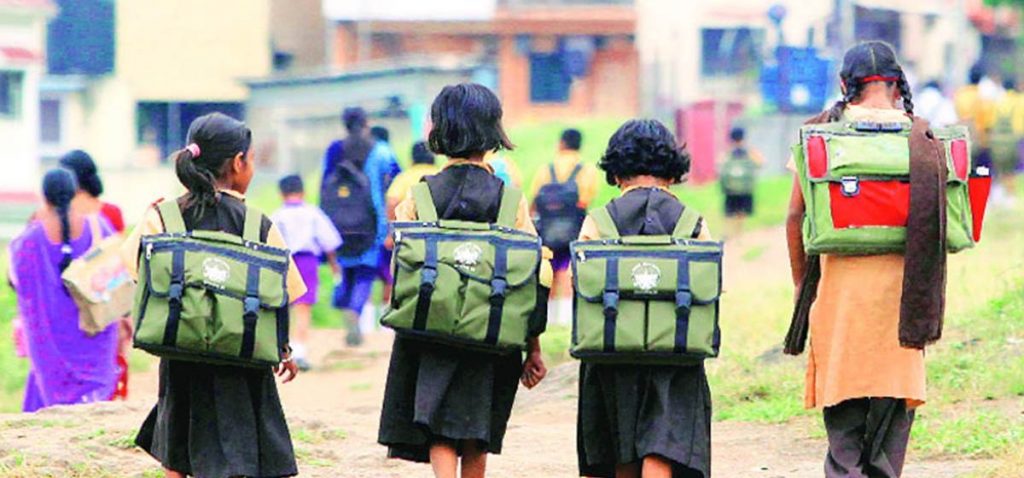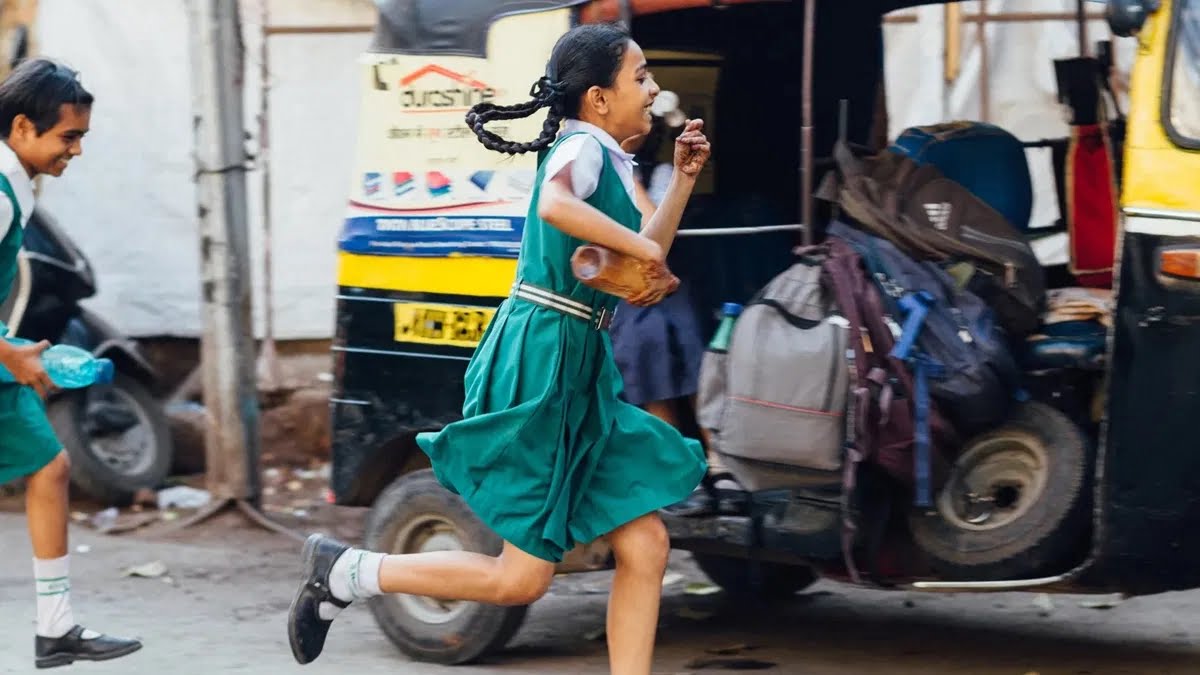According to the fourth annual UNESCO Global Education Monitoring (GEM) Report released this year on June 23, about 40 percent of low and lower-middle-income countries have not provided supportive measures to disadvantaged learners during school shutdown, which was announced under the lockdown to prevent the transmission of the COVID-19 virus.
The lockdown has emphasised the need to re-evaluate our educational system to make it more inclusive and challenge the oppressive social structure. In this essay, we have tried to focus on understanding the impact of the ongoing crisis on girl’s education in our country. The pandemic is not just a public health challenge but it has also disrupted the social systems and institutions and fragile immunity against social inequalities. The women and girls are among the most affected groups during the pandemic lockdown. Yet, gender-based violence is not a recent event that emerged during this period. For women in India, snapping the mobility, income, their circle of social solidarity had its consequences.
The women and girls are among the most affected groups during the pandemic lockdown. Yet, gender-based violence is not a recent event that emerged during this period. For women in India, snapping the mobility, income, their circle of social solidarity had its consequences.
Also read: How Did COVID-19 Impact Reproductive Health Services In India?
Although some predictions and discussions were constantly voiced out by the academicians and the activists, the system had a two-faced fallout. One is not being equipped with enough resources and technology to shift to online mode and the other for assuming that everyone can access to online classes. The overlooking of the vulnerability of social groups led to other kinds of crises, girl education is one that is not addressed by the mainstream media in the patriarchal country.
To continue the classes, even during a pandemic, the entire school system shifted to digital mode. The teaching-learning process on digital platforms is not equitable to face-to-face education mode. Schools as a social institution do propagate and work on the patriarchal values, however, it is a space that provides more accessibility to resources and mobility to girls, as compared to their homes. The idea of online classes in itself is coming from a privileged and patriarchal system. This shift to digital learning is an integral part of the inequalities and discrimination that exist outside the online mode.
Further, at homes, who is burdened with the additional household chores among all the members of the family? Who has access to technology? Even if you have access, who among the children in a family is given preference to attend online classes? Who is threatened to be married off? And who mostly face gender-based violence even in private spaces such as one’s own family? When we do not put forward these questions, the concerns regarding women’s education get sidelined.

All these questions need to be answered to make gender-based educational concerns visible to everyone. The following concerns need to be raised and discussed:
Access To Technology
Unequal access to technology has raised many questions and fuel the consequences for women, around education and employment. As the classes shift to online mode, the girls in a country like India, are more likely to lose out on the classes given the conditions that boys have access to the internet and personal devices. This may exacerbate the existing gap in the education of both boys and girls. We live in a patriarchal society, where the control over resources and knowledge lies in the hands of males, even if they are younger.
Unequal access to technology has raised many questions and fuel the consequences for women, around education and employment. As the classes shift to online mode, the girls in a country like India, are more likely to lose out on the classes given the conditions that boys have access to the internet and personal devices.
Several people are losing their jobs or are now getting paid less than their usual salary. Managing finances during this crisis is challenging. The expenses double up; and buying a digital device, excessive electricity bills and internet pack recharges become expenses to worry about.
Earlier, in June, a 14-year-old SC girl in Kerala died by suicide, as she couldn’t attend online classes due to lack of technology, as her father, being a daily-wage laborer, couldn’t buy her a mobile phone. This is one of the instances that made it to the mainstream media, while many go unrecognised and unreported.
In homes where there are both boys and girls studying, the brother gets preference to have access to online classes via mobile phones. In several patriarchal families, where it is normal to police the woman’s everyday life, these online classes became an opportunity for them to gauge what their daughters are watching or listening to during the online classes.
There is an urgent need for the state to ensure that teaching-learning becomes a gender-positive approach for equitable access to technology.
Additional Household Work
Our homes aren’t gender-neutral spaces and the stereotypes are saturated in a way that women (irrespective of age) bear the most burden of domestic chores. The primary responsibility of a woman is still considered to be unpaid domestic care work.
In a conversation with the teachers, it was found that the teachers were requested to keep the classes around 6 or 7 in the morning so that girls can manage and take time out for the household chores and responsibilities, whereas there were no such responsibilities on boys, they used to wake up at 10 or later in the day.
The situation is even grave for girls living in a joint family. They are expected to wake up early, do the cleaning, washing, cooking, taking care of elders, and then attend the online classes. The case is not the same for boys or men in the family. Even if they participated in the household work for a while, their work is considered as not more than a helping hand. They can enjoy and have leisure time, which women are denied.
These instances are not limited to girls attending schools. This additional workload cut across the class, caste, age, education, and profession. Then, how is this an equitable practice of teaching-learning from home?
Gender-Based Violence
Gender-based violence influences and shapes the women’s experience of work and education, both in private as well as in public spaces. The stereotypical assumption that continued to be the foundation of work-spaces is that private work (domestic responsibility and role as primary caregivers) is not considered as ‘work’ within one’s own family.
This gender-based violence has a broad spectrum that begins from private spaces, that is home by denying access to basic amenities such as food, leisure time, mobility, and domestic violence. The severity of gender-based violence deepens as it intersects with other social hierarchies of caste, class, religion, region, ethnicity, age, and disability.
Other than engaging only in academics, schools also provided a safe space for children, and especially girls. In schools, they have a lot of opportunities to talk to their teachers, peers, and friends. They are free from household and care work, they can play and engage in all sorts of activities, which provide them a sense of belonging and encourages them to aspire. Now, locked in homes, they have nowhere to go or someone to talk to other than engaging in forced household work.
Other than engaging only in academics, schools also provided a safe space for children, and especially girls. In schools, they have a lot of opportunities to talk to their teachers, peers, and friends. They are free from household and care work, they can play and engage in all sorts of activities, which provide the girls a sense of belonging and encourages them to aspire.
Also read: COVID-19: How The Pandemic May Increase Human Trafficking in India
Year Dropout Leading To Child Marriage
In addition to not being able to attend online classes and the increased burden of household labour, one shadow epidemic that has resulted due to the COVID-19 pandemic is the early marriage of girls. The effects of the pandemic are life-altering for several girls in India, in the sense that many would never return to school and will be forced to get married.
Patricia Scotland writes, “During the present COVID-19 pandemic, mass school closures are tending to entrench learning gaps between girls and boys and putting many more girls at risk of sexual exploitation, early pregnancy, and early or forced marriage. They also mean that children are unable to report abuse to a trusted teacher.”
India faced an increase in child marriage during this lockdown. A month after the lockdown, a daily-wage laborer from Odisha tried to marry off his 16-year-old daughter to a 26-year-old truck driver.
Professor Amita Rampal, Educationist, Delhi University, states, “It is estimated that about 20 percent of girls are not going to come back to school after lockdown….most of the girls from families of migrant workers are in the vulnerable age where they are likely to get married.”
Girls and women seem to be fighting a double pandemic during this lockdown period, one that is restricting all of us to go outside, and the other one exclusive for girls, is child marriage or forced marriages even of the women studying in higher educational institutions.
Featured Image Source: LiveWire





Covid will doom a generation in India – in so far as education is concerned !
The Chaiwala (Tea Seller) PM of India THOUGHT THAT HE HAD Found the solution to COVID.The man was born to doom Hindoosthan and the Hindoos and world. dindooo hindoo
His solution is to switch off the lights for 9 minutes at 9 pm and light candles,torches and cell phone lights – the sign of impending and inevitable doom.
business-standard.com/ article/ current-affairs/ coronavirus-on-pm-modi-s-exhortation-india-to-light-lamps-at-9-pm-today-120040500319_1.html
His aim is to plunge the Indians into the darkness of the shit hole – in which they are already resident.The Darkness of death in a morgue or a grave – as a premonition of a cold and miserable death
The Indian PM’s mother was and is a dishwasher.
1 week earlier he asked Indians to beat utensils in public on the roads – as an ode to his mother.
theprint.in/india/after-bartan-bajao-pm-modi-asks-indians-to-light-lamps-candles-as-symbols-of-hope/394181/
Another Indian Genius is using Cow Piss on a large scale,to cure COVID
deccanherald.com/national/national-politics/cow-urine-for-covid-19-becomes-bone-of-contention-in-west-bengal-bjp-815839.html
When Babar was at the doors of Hindoosthan – Hindoos were praying to idols of Shiva and sacrificing goats,bulls and temple prostitutes. Rest is History
1300 years ago, a man called Beruni made a prophetic statement on the worth of the Indian race
The words of Beruni are prophetic,in this regard.
– The Hindus believe that there is no country but theirs, no nation like theirs, no kings like theirs, no religion like theirs, no science like theirs.
– They are haughty, foolishly vain, self-conceited, and stolid.
– They are by nature niggardly in Communicating that which they know, and they take the greatest possible care to withhold it from men of another caste among their own people,still much more, of course, from any foreigner